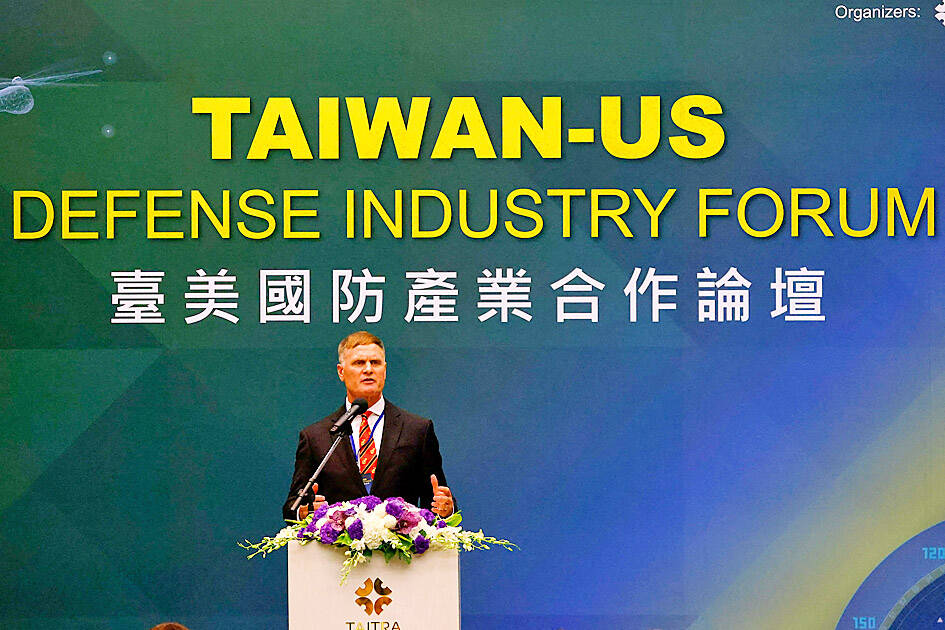A delegation of US defense contractors and a former senior leader of the US Marine Corps yesterday pledged the beginning of deeper cooperation with Taiwan.
Taiwan has faced increasing pressure from China in the years since Tsai Ing-wen (蔡英文) was elected president. China has poached several of Taiwan’s diplomatic allies and sent military planes and ships toward the nation on a near-daily basis. It also held large-scale drills modeling a blockade and simulated strikes on important targets in Taiwan twice within the past year.
Speaking at a public forum in Taipei, former US Marine Corps Forces Pacific commander Steven Rudder said the US wants to be part of the defense capabilities of Taiwan and bolster its supply chain resilience.

Photo: Ann Wang, Reuters
He also emphasized how critical the nation’s position is for security.
“For the Asia-Pacific, I would offer there’s not another more important area in the world to maintain peace,” Rudder told the Taiwan-US Defense Industry Forum. “So [when] you hear ‘a free and open Indo-Pacific,’ this is a small part of ensuring that shared vision remains intact.”
“We want to be part of the self-defense capabilities of Taiwan,” he said.
Rudder said the visit was within the US’ multiple agreements with China and laws related to Taiwan, such as the Taiwan Relations Act, which requires Washington to ensure Taiwan can defend itself.
The legislation was enacted decades ago when the US first recognized China and broke off official diplomatic relations with Taipei.
The event was cohosted by trade groups from Taiwan and the US as the public-facing portion of the defense contractors’ visit.
Although it was unclear whether the groups would sign specific deals, Chinese-language media reported that the US was looking at cooperation in production of certain products.
Part of that cooperation would seek to ensure that both sides can work together to use the weapons systems Taiwan bought alongside the nation’s self-produced defense capabilities.
Washington is Taiwan’s largest unofficial partner and the supplier of a vast majority of is defense purchases.
“I’ll say it very simply: The endgame is joint interoperability,” Rudder said.
A group of about 20 people protested outside.
“American warmongers are a scourge on Taiwan,” one of their banners read.
“They sell all sorts of outdated ammunition to Taiwan and make tens of billions of US dollars from Taiwan every year,” said David T. Chien (錢達), vice chair of the Blue Sky Action Alliance, which supports unification with China.
From 6am on Tuesday to 6am yesterday, 27 Chinese warplanes and a drone flew toward Taiwan, the Ministry of National Defense said.
The drone encircled Taiwan proper, while seven Chinese navy vessels sailed the waters close by, the ministry said.

CHAOS: Iranians took to the streets playing celebratory music after reports of Khamenei’s death on Saturday, while mourners also gathered in Tehran yesterday Iranian Supreme Leader Ayatollah Ali Khamenei was killed in a major attack on Iran launched by Israel and the US, throwing the future of the Islamic republic into doubt and raising the risk of regional instability. Iranian state television and the state-run IRNA news agency announced the 86-year-old’s death early yesterday. US President Donald Trump said it gave Iranians their “greatest chance” to “take back” their country. The announcements came after a joint US and Israeli aerial bombardment that targeted Iranian military and governmental sites. Trump said the “heavy and pinpoint bombing” would continue through the week or as long

TRUST: The KMT said it respected the US’ timing and considerations, and hoped it would continue to honor its commitments to helping Taiwan bolster its defenses and deterrence US President Donald Trump is delaying a multibillion-dollar arms sale to Taiwan to ensure his visit to Beijing is successful, a New York Times report said. The weapons sales package has stalled in the US Department of State, the report said, citing US officials it did not identify. The White House has told agencies not to push forward ahead of Trump’s meeting with Chinese President Xi Jinping (習近平), it said. The two last month held a phone call to discuss trade and geopolitical flashpoints ahead of the summit. Xi raised the Taiwan issue and urged the US to handle arms sales to

A magnitude 5.6 earthquake struck off the coast of Yilan County at 12:37pm today, with clear shaking felt across much of northern Taiwan. There were no immediate reports of damage. The epicenter of the quake was 16.9km east-southeast of Yilan County Hall offshore at a depth of 66.8km, Central Weather Administration (CWA) data showed. The maximum intensity registered at a 4 in Yilan County’s Nanao Township (南澳) on Taiwan’s seven-tier scale. Other parts of Yilan, as well as certain areas of Hualien County, Taipei, New Taipei City, Taoyuan, Hsinchu County, Taichung and Miaoli County, recorded intensities of 3. Residents of Yilan County and Taipei received

Taiwan has secured another breakthrough in fruit exports, with jujubes, dragon fruit and lychees approved for shipment to the EU, the Ministry of Agriculture said yesterday. The Animal and Plant Health Inspection Agency on Thursday received formal notification of the approval from the EU, the ministry said, adding that the decision was expected to expand Taiwanese fruit producers’ access to high-end European markets. Taiwan exported 126 tonnes of lychees last year, valued at US$1.48 million, with Japan accounting for 102 tonnes. Other export destinations included New Zealand, Hong Kong, the US and Australia, ministry data showed. Jujube exports totaled 103 tonnes, valued at